#especially since he is not allowed to have any visitors at all because of covid
Text
.
#tw death#tw covid#my 90 y/o grandfather is at the ICU right now#and he is being tested for covid#I don't think anyone has a lot of hopes that he will make it out of the hospital#I am not really close to him#because of the distance and because he was never warm in a way my grandma was#but my mom and her siblings just love him so much and seeing how it impacts them#really gets to me#especially since he is not allowed to have any visitors at all because of covid#and dying alone while being connected to five different machines that try to keep him alive#was always the way he did not want to go#I haven't heard my aunts and uncles voices in a long time#and now we are getting many voice messages with updates and the pain in their voice hurts a lot#wow#look at me oversharing on tumblr dot com#I just needed to vent somewhere where it didn't matter at all I guess
10 notes
·
View notes
Text
Anonymous asked: I enjoyed reading your posts about Napoleon’s death and it’s quite timely given its the 200th anniversary of his death this year in May. I was wondering, because you know a lot about military history (your served right? That’s cool to fly combat helicopters) and you live in France but aren’t French, what your take was on Napoleon and how do the French view him? Do they hail him as a hero or do they like others see him like a Hitler or a Stalin? Do you see him as a hero or a villain of history?
5 May 1821 was a memorable date because Napoleon, one of the most iconic figures in world history, died while in bitter exile on a remote island in the South Atlantic Ocean. Napoleon Bonaparte, as you know rose from obscure soldier to a kind of new Caesar, and yet he remains a uniquely controversial figure to this day especially in France. You raise interesting questions about Napoleon and his legacy. If I may reframe your questions in another way. Should we think of him as a flawed but essentially heroic visionary who changed Europe for the better? Or was he simply a military dictator, whose cult of personality and lust for power set a template for the likes of Hitler?
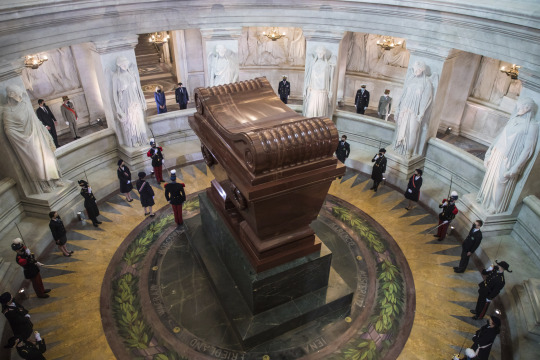
However one chooses to answer this question can we just - to get this out of the way - simply and definitively say that Napoleon was not Hitler. Not even close. No offence intended to you but this is just dumb ahistorical thinking and it’s a lazy lie. This comparison was made by some in the horrid aftermath of the Second World War but only held little currency for only a short time thereafter. Obviously that view didn’t exist before Hitler in the 19th Century and these days I don’t know any serious historian who takes that comparison seriously.
I confess I don’t have a definitive answer if he was a hero or a villain one way or the other because Napoleon has really left a very complicated legacy. It really depends on where you’re coming from.
As a staunch Brit I do take pride in Britain’s victorious war against Napoleonic France - and in a good natured way rubbing it in the noses of French friends at every opportunity I get because it’s in our cultural DNA and it’s bloody good fun (why else would we make Waterloo train station the London terminus of the Eurostar international rail service from its opening in 1994? Or why hang a huge gilded portrait of the Duke of Wellington as the first thing that greets any visitor to the residence of the British ambassador at the British Embassy?). On a personal level I take special pride in knowing my family ancestors did their bit on the battlefield to fight against Napoleon during those tumultuous times. However, as an ex-combat veteran who studied Napoleonic warfare with fan girl enthusiasm, I have huge respect for Napoleon as a brilliant military commander. And to makes things more weird, as a Francophile resident of who loves living and working in France (and my partner is French) I have a grudging but growing regard for Napoleon’s political and cultural legacy, especially when I consider the current dross of political mediocrity on both the political left and the right. So for me it’s a complicated issue how I feel about Napoleon, the man, the soldier, and the political leader.
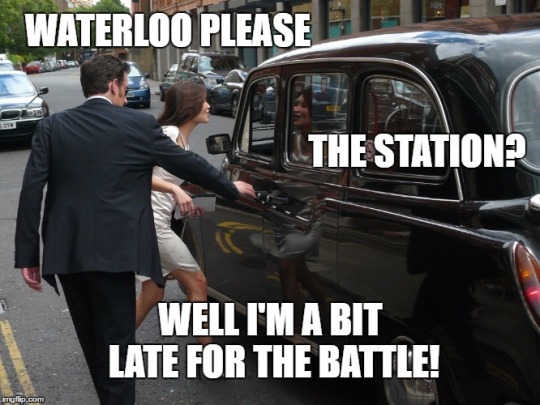
If it’s not so straightforward for me to answer the for/against Napoleon question then it It’s especially true for the French, who even after 200 years, still have fiercely divided opinions about Napoleon and his legacy - but intriguingly, not always in clear cut ways.
I only have to think about my French neighbours in my apartment building to see how divisive Napoleon the man and his legacy is. Over the past year or so of the Covid lockdown we’ve all gotten to know each other better and we help each other. Over the Covid year we’ve gathered in the inner courtyard for a buffet and just lifted each other spirits up.
One of my neighbours, a crusty old ex-general in the army who has an enviable collection of military history books that I steal, liberate, borrow, often discuss military figures in history like Napoleon over our regular games of chess and a glass of wine. He is from very old aristocracy of the ancien regime and whose family suffered at the hands of ‘madame guillotine’ during the French Revolution. They lost everything. He has mixed emotions about Napoleon himself as an old fashioned monarchist. As a military man he naturally admires the man and the military genius but he despises the secularisation that the French Revolution ushered in as well as the rise of the haute bourgeois as middle managers and bureaucrats by the displacement of the aristocracy.
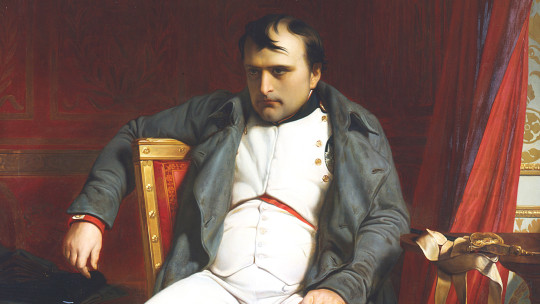
Another retired widowed neighbour I am close to, and with whom I cook with often and discuss art, is an active arts patron and ex-art gallery owner from a very wealthy family that came from the new Napoleonic aristocracy - ie the aristocracy of the Napoleonic era that Napoleon put in place - but she is dismissive of such titles and baubles. She’s a staunch Republican but is happy to concede she is grateful for Napoleon in bringing order out of chaos. She recognises her own ambivalence when she says she dislikes him for reintroducing slavery in the French colonies but also praises him for firmly supporting Paris’s famed Comédie-Française of which she was a past patron.
Another French neighbour, a senior civil servant in the Elysée, is quite dismissive of Napoleon as a war monger but is grudgingly grateful for civil institutions and schools that Napoleon established and which remain in place today.
My other neighbours - whether they be French families or foreign expats like myself - have similarly divisive and complicated attitudes towards Napoleon.

In 2010 an opinion poll in France asked who was the most important man in French history. Napoleon came second, behind General Charles de Gaulle, who led France from exile during the German occupation in World War II and served as a postwar president.
The split in French opinion is closely mirrored in political circles. The divide is generally down political party lines. On the left, there's the 'black legend' of Bonaparte as an ogre. On the right, there is the 'golden legend' of a strong leader who created durable institutions.
Jacques-Olivier Boudon, a history professor at Paris-Sorbonne University and president of the Napoléon Institute, once explained at a talk I attended that French public opinion has always remained deeply divided over Napoleon, with, on the one hand, those who admire the great man, the conqueror, the military leader and, on the other, those who see him as a bloodthirsty tyrant, the gravedigger of the revolution. Politicians in France, Boudon observed, rarely refer to Napoleon for fear of being accused of authoritarian temptations, or not being good Republicans.
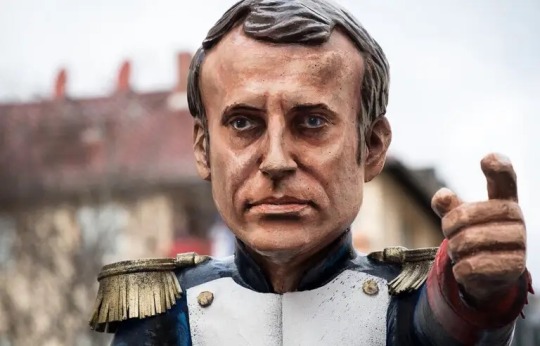
On the left-wing of French politics, former prime minister Lionel Jospin penned a controversial best selling book entitled “the Napoleonic Evil” in which he accused the emperor of “perverting the ideas of the Revolution” and imposing “a form of extreme domination”, “despotism” and “a police state” on the French people. He wrote Napoleon was "an obvious failure" - bad for France and the rest of Europe. When he was booted out into final exile, France was isolated, beaten, occupied, dominated, hated and smaller than before. What's more, Napoleon smothered the forces of emancipation awakened by the French and American revolutions and enabled the survival and restoration of monarchies. Some of the legacies with which Napoleon is credited, including the Civil Code, the comprehensive legal system replacing a hodgepodge of feudal laws, were proposed during the revolution, Jospin argued, though he acknowledges that Napoleon actually delivered them, but up to a point, "He guaranteed some principles of the revolution and, at the same time, changed its course, finished it and betrayed it," For instance, Napoleon reintroduced slavery in French colonies, revived a system that allowed the rich to dodge conscription in the military and did nothing to advance gender equality.
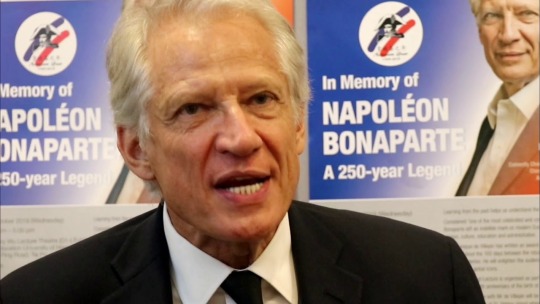
At the other end of the spectrum have been former right-wing prime minister Dominique de Villepin, an aristocrat who was once fancied as a future President, a passionate collector of Napoleonic memorabilia, and author of several works on the subject. As a Napoleonic enthusiast he tells a different story. Napoleon was a saviour of France. If there had been no Napoleon, the Republic would not have survived. Advocates like de Villepin point to Napoleon’s undoubted achievements: the Civil Code, the Council of State, the Bank of France, the National Audit office, a centralised and coherent administrative system, lycées, universities, centres of advanced learning known as école normale, chambers of commerce, the metric system, and an honours system based on merit (which France has to this day). He restored the Catholic faith as the state faith but allowed for the freedom of religion for other faiths including Protestantism and Judaism. These were ambitions unachieved during the chaos of the revolution. As it is, these Napoleonic institutions continue to function and underpin French society. Indeed, many were copied in countries conquered by Napoleon, such as Italy, Germany and Poland, and laid the foundations for the modern state.
Back in 2014, French politicians and institutions in particular were nervous in marking the 200th anniversary of Napoleon's exile. My neighbours and other French friends remember that the commemorations centred around the Chateau de Fontainebleau, the traditional home of the kings of France and was the scene where Napoleon said farewell to the Old Guard in the "White Horse Courtyard" (la cour du Cheval Blanc) at the Palace of Fontainebleau. (The courtyard has since been renamed the "Courtyard of Goodbyes".) By all accounts the occasion was very moving. The 1814 Treaty of Fontainebleau stripped Napoleon of his powers (but not his title as Emperor of the French) and sent him into exile on Elba. The cost of the Fontainebleau "farewell" and scores of related events over those three weekends was shouldered not by the central government in Paris but by the local château, a historic monument and UNESCO World Heritage site, and the town of Fontainebleau.
While the 200th anniversary of the French Revolution that toppled the monarchy and delivered thousands to death by guillotine was officially celebrated in 1989, Napoleonic anniversaries are neither officially marked nor celebrated. For example, over a decade ago, the president and prime minister - at the time, Jacques Chirac and Dominque de Villepin - boycotted a ceremony marking the 200th anniversary of the battle of Austerlitz, Napoleon's greatest military victory. Both men were known admirers of Napoleon and yet political calculation and optics (as media spin doctors say) stopped them from fully honouring Napoleon’s crowning military glory.
Optics is everything. The division of opinion in France is perhaps best reflected in the fact that, in a city not shy of naming squares and streets after historical figures, there is not a single “Boulevard Napoleon” or “Place Napoleon” in Paris. On the streets of Paris, there are just two statues of Napoleon. One stands beneath the clock tower at Les Invalides (a military hospital), the other atop a column in the Place Vendôme. Napoleon's red marble tomb, in a crypt under the Invalides dome, is magnificent, perhaps because his remains were interred there during France's Second Empire, when his nephew, Napoleon III, was on the throne.
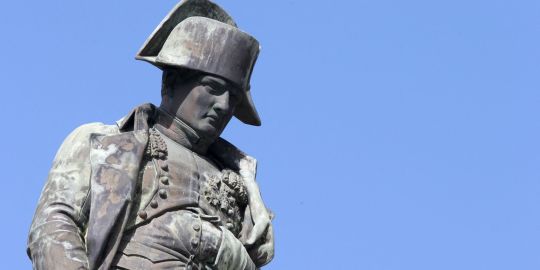
There are no squares, nor places, nor boulevards named for Napoleon but as far as I know there is one narrow street, the rue Bonaparte, running from the Luxembourg Gardens to the River Seine in the old Latin Quarter. And, that, too, is thanks to Napoleon III. For many, and I include myself, it’s a poor return by the city to the man who commissioned some of its most famous monuments, including the Arc de Triomphe and the Pont des Arts over the River Seine.
It's almost as if Napoleon Bonaparte is not part of the national story.
How Napoleon fits into that national story is something historians, French and non-French, have been grappling with ever since Napoleon died. The plain fact is Napoleon divides historians, what precisely he represents is deeply ambiguous and his political character is the subject of heated controversy. It’s hard for historians to sift through archival documents to make informed judgements and still struggle to separate the man from the myth.
One proof of this myth is in his immortality. After Hitler’s death, there was mostly an embarrassed silence; after Stalin’s, little but denunciation. But when Napoleon died on St Helena in 1821, much of Europe and the Americas could not help thinking of itself as a post-Napoleonic generation. His presence haunts the pages of Stendhal and Alfred de Vigny. In a striking and prescient phrase, Chateaubriand prophesied the “despotism of his memory”, a despotism of the fantastical that in many ways made Romanticism possible and that continues to this day.
The raw material for the future Napoleon myth was provided by one of his St Helena confidants, the Comte de las Cases, whose account of conversations with the great man came out shortly after his death and ran in repeated editions throughout the century. De las Cases somehow metamorphosed the erstwhile dictator into a herald of liberty, the emperor into a slayer of dynasties rather than the founder of his own. To the “great man” school of history Napoleon was grist to their mill, and his meteoric rise redefined the meaning of heroism in the modern world.
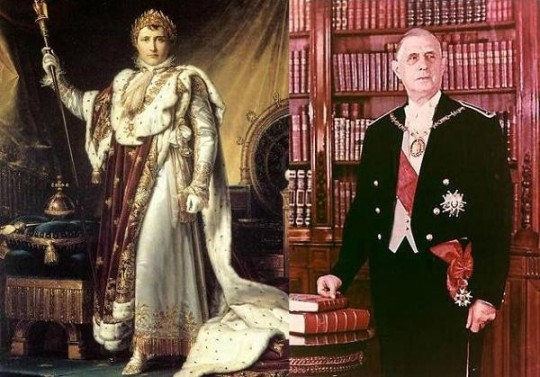
The Marxists, for all their dislike of great men, grappled endlessly with the meaning of the 18th Brumaire; indeed one of France’s most eminent Marxist historians, George Lefebvre, wrote what arguably remains the finest of all biographies of him.
It was on this already vast Napoleon literature, a rich terrain for the scholar of ideas, that the great Dutch historian Pieter Geyl was lecturing in 1940 when he was arrested and sent to Buchenwald. There he composed what became one of the classics of historiography, a seminal book entitled Napoleon: For and Against, which charted how generations of intellectuals had happily served up one Napoleon after another. Like those poor souls who crowded the lunatic asylums of mid-19th century France convinced that they were Napoleon, generations of historians and novelists simply could not get him out of their head.
The debate runs on today no less intensely than in the past. Post-Second World War Marxists would argue that he was not, in fact, revolutionary at all. Eric Hobsbawm, a notable British Marxist historian, argued that ‘Most-perhaps all- of his ideas were anticipated by the Revolution’ and that Napoleon’s sole legacy was to twist the ideals of the French Revolution, and make them ‘more conservative, hierarchical and authoritarian’.
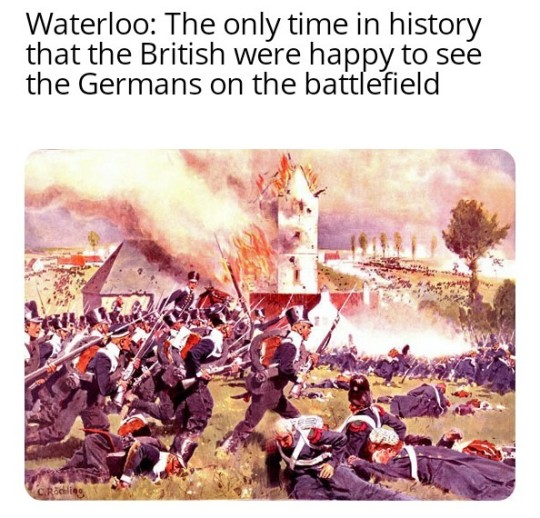
This contrasts deeply with the view William Doyle holds of Napoleon. Doyle described Bonaparte as ‘the Revolution incarnate’ and saw Bonaparte’s humbling of Europe’s other powers, the ‘Ancien Regimes’, as a necessary precondition for the birth of the modern world. Whatever one thinks of Napoleon’s character, his sharp intellect is difficult to deny. Even Paul Schroeder, one of Napoleon’s most scathing critics, who condemned his conduct of foreign policy as a ‘criminal enterprise’ never denied Napoleon’s intellect. Schroder concluded that Bonaparte ‘had an extraordinary capacity for planning, decision making, memory, work, mastery of detail and leadership’. The question of whether Napoleon used his genius for the betterment or the detriment of the world, is the heart of the debate which surrounds him.
France's foremost Napoleonic scholar, Jean Tulard, put forward the thesis that Bonaparte was the architect of modern France. "And I would say also pâtissier [a cake and pastry maker] because of the administrative millefeuille that we inherited." Oddly enough, in North America the multilayered mille-feuille cake is called ‘a napoleon.’ Tulard’s works are essential reading of how French historians have come to tackle the question of Napoleon’s legacy. He takes the view that if Napoleon had not crushed a Royalist rebellion and seized power in 1799, the French monarchy and feudalism would have returned, Tulard has written. "Like Cincinnatus in ancient Rome, Napoleon wanted a dictatorship of public salvation. He gets all the power, and, when the project is finished, he returns to his plough." In the event, the old order was never restored in France. When Louis XVIII became emperor in 1814, he served as a constitutional monarch.
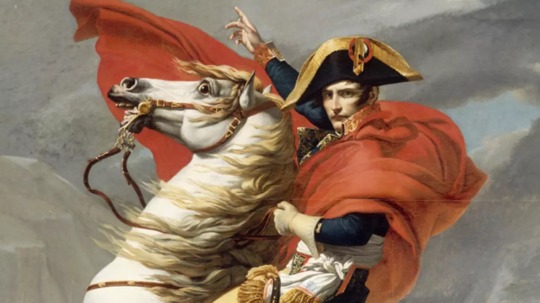
In England, until recently the views on Napoleon have traditionally less charitable and more cynical. Professor Christopher Clark, the notable Cambridge University European historian, has written. "Napoleon was not a French patriot - he was first a Corsican and later an imperial figure, a journey in which he bypassed any deep affiliation with the French nation," Clark believed Napoleon’s relationship with the French Revolution is deeply ambivalent.
Did he stabilise the revolutionary state or shut it down mercilessly? Clark believes Napoleon seems to have done both. Napoleon rejected democracy, he suffocated the representative dimension of politics, and he created a culture of courtly display. A month before crowning himself emperor, Napoleon sought approval for establishing an empire from the French in a plebiscite; 3,572,329 voted in favour, 2,567 against. If that landslide resembles an election in North Korea, well, this was no secret ballot. Each ‘yes’ or ‘no’ was recorded, along with the name and address of the voter. Evidently, an overwhelming majority knew which side their baguette was buttered on.
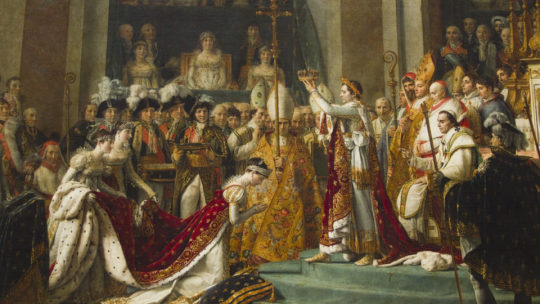
His extravagant coronation in Notre Dame in December 1804 cost 8.5 million francs (€6.5 million or $8.5 million in today's money). He made his brothers, sisters and stepchildren kings, queens, princes and princesses and created a Napoleonic aristocracy numbering 3,500. By any measure, it was a bizarre progression for someone often described as ‘a child of the Revolution.’ By crowning himself emperor, the genuine European kings who surrounded him were not convinced. Always a warrior first, he tried to represent himself as a Caesar, and he wears a Roman toga on the bas-reliefs in his tomb. His coronation crown, a laurel wreath made of gold, sent the same message. His icon, the eagle, was also borrowed from Rome. But Caesar's legitimacy depended on military victories. Ultimately, Napoleon suffered too many defeats.
These days Napoleon the man and his times remain very much in fashion and we are living through something of a new golden age of Napoleonic literature. Those historians who over the past decade or so have had fun denouncing him as the first totalitarian dictator seem to have it all wrong: no angel, to be sure, he ended up doing far more at far less cost than any modern despot. In his widely praised 2014 biography, Napoleon the Great, Andrew Roberts writes: “The ideas that underpin our modern world - meritocracy, equality before the law, property rights, religious toleration, modern secular education, sound finances, and so on - were championed, consolidated, codified and geographically extended by Napoleon. To them he added a rational and efficient local administration, an end to rural banditry, the encouragement of science and the arts, the abolition of feudalism and the greatest codification of laws since the fall of the Roman empire.”
Roberts partly bases his historical judgement on newly released historical documents about Napoleon that were only available in the past decade and has proved to be a boon for all Napoleonic scholars. Newly released 33,000 letters Napoleon wrote that still survive are now used extensively to illustrate the astonishing capacity that Napoleon had for compartmentalising his mind - he laid down the rules for a girls’ boarding school on the eve of the battle of Borodino, for example, and the regulations for Paris’s Comédie-Française while camped in the Kremlin. They also show Napoleon’s extraordinary capacity for micromanaging his empire: he would write to the prefect of Genoa telling him not to allow his mistress into his box at the theatre, and to a corporal of the 13th Line regiment warning him not to drink so much.
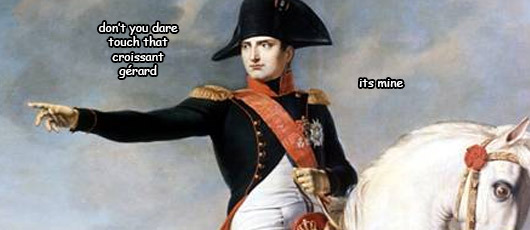
For me to have my own perspective on Napoleon is tough. The problem is that nothing with Napoleon is simple, and almost every aspect of his personality is a maddening paradox. He was a military genius who led disastrous campaigns. He was a liberal progressive who reinstated slavery in the French colonies. And take the French Revolution, which came just before Napoleon’s rise to power, his relationship with the French Revolution is deeply ambivalent. Did he stabilise it or shut it down? I agree with those British and French historians who now believe Napoleon seems to have done both.
On the one hand, Napoleon did bring order to a nation that had been drenched in blood in the years after the Revolution. The French people had endured the crackdown known as the 'Reign of Terror', which saw so many marched to the guillotine, as well as political instability, corruption, riots and general violence. Napoleon’s iron will managed to calm the chaos. But he also rubbished some of the core principles of the Revolution. A nation which had boldly brought down the monarchy had to watch as Napoleon crowned himself Emperor, with more power and pageantry than Louis XVI ever had. He also installed his relatives as royals across Europe, creating a new aristocracy. In the words of French politician and author Lionel Jospin, 'He guaranteed some principles of the Revolution and at the same time, changed its course, finished it and betrayed it.'
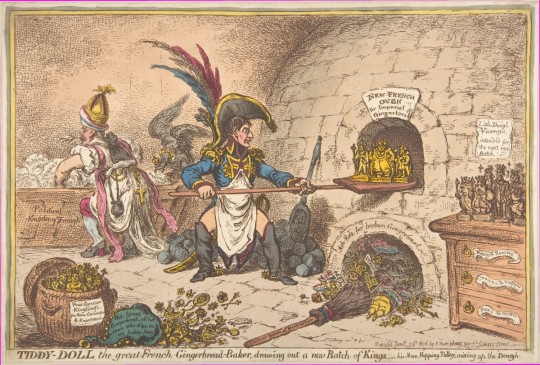
He also had a feared henchman in the form of Joseph Fouché, who ran a secret police network which instilled dread in the population. Napoleon’s spies were everywhere, stifling political opposition. Dozens of newspapers were suppressed or shut down. Books had to be submitted for approval to the Commission of Revision, which sounds like something straight out of George Orwell. Some would argue Hitler and Stalin followed this playbook perfectly.
But here come the contradictions. Napoleon also championed education for all, founding a network of schools. He championed the rights of the Jews. In the territories conquered by Napoleon, laws which kept Jews cooped up in ghettos were abolished. 'I will never accept any proposals that will obligate the Jewish people to leave France,' he once said, 'because to me the Jews are the same as any other citizen in our country.'
He also, crucially, developed the Napoleonic Code, a set of laws which replaced the messy, outdated feudal laws that had been used before. The Napoleonic Code clearly laid out civil laws and due processes, establishing a society based on merit and hard work, rather than privilege. It was rolled out far beyond France, and indisputably helped to modernise Europe. While it certainly had its flaws – women were ignored by its reforms, and were essentially regarded as the property of men – the Napoleonic Code is often brandished as the key evidence for Napoleon’s progressive credentials. In the words of historian Andrew Roberts, author of Napoleon the Great, 'the ideas that underpin our modern world… were championed by Napoleon'.
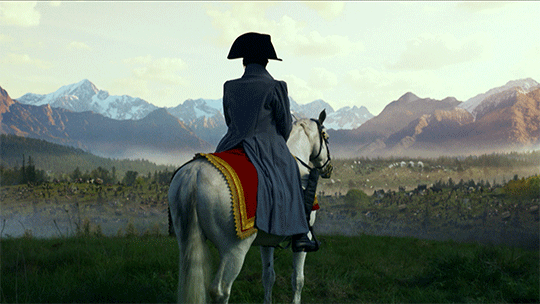
What about Napoleon’s battlefield exploits? If anything earns comparisons with Hitler, it’s Bonaparte’s apparent appetite for conquest. His forces tore down republics across Europe, and plundered works of art, much like the Nazis would later do. A rampant imperialist, Napoleon gleefully grabbed some of the greatest masterpieces of the Renaissance, and allegedly boasted, 'the whole of Rome is in Paris.'
Napoleon has long enjoyed a stellar reputation as a field commander – his capacities as a military strategist, his ability to read a battle, the painstaking detail with which he made sure that he cold muster a larger force than his adversary or took maximum advantage of the lie of the land – these are stuff of the military legend that has built up around him. It is not without its critics, of course, especially among those who have worked intensively on the later imperial campaigns, in the Peninsula, in Russia, or in the final days of the Empire at Waterloo.
Doubts about his judgment, and allegations of rashness, have been raised in the context of some of his victories, too, most notably, perhaps, at Marengo. But overall his reputation remains largely intact, and his military campaigns have been taught in the curricula of military academies from Saint-Cyr to Sandhurst, alongside such great tacticians as Alexander the Great and Hannibal.
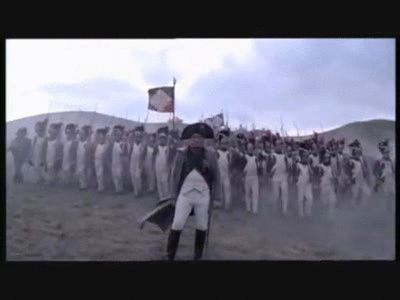
Historians may query his own immodest opinion that his presence on the battlefield was worth an extra forty thousand men to his cause, but it is clear that when he was not present (as he was not for most of the campaign in Spain) the French were wont to struggle. Napoleon understood the value of speed and surprise, but also of structures and loyalties. He reformed the army by introducing the corps system, and he understood military aspirations, rewarding his men with medals and honours; all of which helped ensure that he commanded exceptional levels of personal loyalty from his troops.
Yet, I do find it hard to side with the more staunch defenders of Napoleon who say his reputation as a war monger is to some extent due to British propaganda at the time. They will point out that the Napoleonic Wars, far from being Napoleon’s fault, were just a continuation of previous conflicts that arose thanks to the French Revolution. Napoleon, according to this analysis, inherited a messy situation, and his only real crime was to be very good at defeating enemies on the battlefield. I think that is really pushing things too far. I mean deciding to invade Spain and then Russia were his decisions to invade and conquer.
He was, by any measure, a genius of war. Even his nemesis the Duke of Wellington, when asked who the greatest general of his time was, replied: 'In this age, in past ages, in any age, Napoleon.'
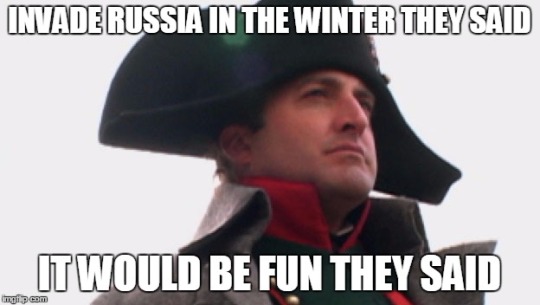
I will qualify all this and agree that Napoleon’s Russian campaign has been rightly held up as a fatal folly which killed so many of his men, but this blunder – epic as it was – should not be compared to Hitler’s wars of evil aggression. Most historians will agree that comparing the two men is horribly flattering to Hitler - a man fuelled by visceral, genocidal hate - and demeaning to Napoleon, who was a product of Enlightenment thinking and left a legacy that in many ways improved Europe.
Napoleon was, of course, no libertarian, and no pluralist. He would tolerate no opposition to his rule, and though it was politicians and civilians who imposed his reforms, the army was never far behind. But comparisons with twentieth-century dictators are well wide of the mark. While he insisted on obedience from those he administered, his ideology was based not on division or hatred, but on administrative efficiency and submission to the law. And the state he believed in remained stubbornly secular.
In Catholic southern Europe, of course, that was not an approach with which it was easy to acquiesce; and disorder, insurgency and partisan attacks can all be counted among the results. But these were principles on which the Emperor would not and could not give ground. If he had beliefs they were not religious or spiritual beliefs, but the secular creed of a man who never forgot that he owed both his military career and his meteoric political rise to the French Revolution, and who never quite abandoned, amidst the monarchical symbolism and the court pomp of the Empire, the republican dreams of his youth. When he claimed, somewhat ambiguously, after the coup of 18 Brumaire that `the Revolution was over’, he almost certainly meant that the principles of 1789 had at last been consummated, and that the continuous cycle of violence of the 1790s could therefore come to an end.
When the Empire was declared in 1804, the wording, again, might seem curious, the French being informed that the `Republic would henceforth be ruled by an Emperor’. Napoleon might be a dictator, but a part at least of him remained a son of the Enlightenment.
The arguments over Napoleon’s status will continue - and that in itself is a testament to the power of one of the most complex figures ever to straddle the world’s stage.
Will the fascination with Napoleon continue for another 200 years?
In France, at least, enthusiasm looks set to diminish. Napoleon and his exploits are scarcely mentioned in French schools anymore. Stéphane Guégan, curator of the Musée d'Orsay in Paris, which, among other First Empire artworks, houses a plaster model of Napoleon dressed as a Roman emperor astride a horse, has described France's fascination with him as ‘a national illness.’ He believes that the people who met him were fascinated by his charm. And today, even the most hostile to Napoleon also face this charm. So there is a difficulty to apprehend the duality of this character. As he wrote, “He was born from the revolution, he extended and finished it, and after 1804 he turns into a despot, a dictator.”
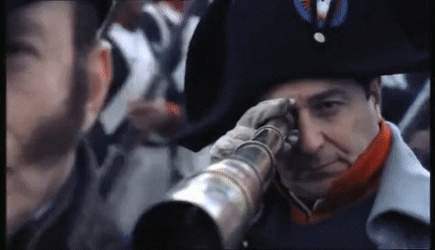
In France, Guégan aptly observes, there is a kind of nostalgia, not for dictatorship but for strong leaders. "Our age is suffering a lack of imagination and political utopia,"
Here I think Guégan is onto something. Napoleon’s stock has always risen or fallen according to the vicissitudes of world events and fortunes of France itself.
In the past, history was the study of great men and women. Today the focus of teaching is on trends, issues and movements. France in 1800 is no longer about Louis XVI and Napoleon Bonaparte. It's about the industrial revolution. Man does not make history. History makes men. Or does it? The study of history makes a mug out of those with such simple ideological driven conceits.
For two hundred years on, the French still cannot agree on whether Napoleon was a hero or a villain as he has swung like a pendulum according to the gravitational pull of historical events and forces.
The question I keep asking of myself and also to French friends with whom I discuss such things is what kind of Napoleon does our generation need?
Thanks for your question.
#question#ask#napoleon#french#french history#history#military history#bonaparte#france#historiography#republic#historians#personal
417 notes
·
View notes
Text
‘Anti-Zionist Naples’: Award-Winning Italian Artist Speaks about Palestine and Why He Quit Photojournalism

Eduardo Castaldo
On April 1, a mural appeared in the Southern Italian city of Naples, depicting Palestinian workers lining at an Israeli military checkpoint near the occupied city of Bethlehem, in the West Bank. It is called ‘Welcome to Bethlehem’.
The mural, which quickly became popular in the town and on social media, was the work of a well-known Italian artist and photographer, Eduardo Castaldo.
Castaldo, who is a cinematic and television photographer, is not your typical artist, as he dedicates part of his time and efforts to championing struggles for human rights, equality and justice, especially in Palestine and throughout the Middle East.
It is only befitting that Castaldo is from Naples, a Southern Italian city with deep historical and cultural connections with Palestine and the Arab world. As Italian culture had itself influenced the Arab world, numerous markers of Arab culture can also be detected in Naples, from the Neapolitan dialect to music and dance, to food and much more.
Moreover, Naples itself is a symbol of the Italian resistance. The September 1943 uprising, known as “Le Quattro Giornate di Napoli” - Four Days of Naples - was a watershed moment in the history of the city as it liberated itself from Nazi German occupation.
Castaldo’s mural of the Palestinian workers is not his only work on Palestine and the Middle East. He has done other artistic displays. Moreover, he has spent years in Palestine working as a photojournalist.
We spoke to the Italian artist to understand his connection with Palestine and the Arab world, his inspirations and his ongoing fight against injustice in all of its forms.
Capturing the Occupation
“This work originated from my experience as a photo reporter in the Middle East,” Castaldo said in reference to ‘Welcome to Bethlehem’.
Castaldo worked as a photojournalist in Palestine for about four years, from 2007-2011. These years allowed him to immerse himself in the Palestinian experience and to “directly witness the cruel dynamics of Israeli military occupation.”
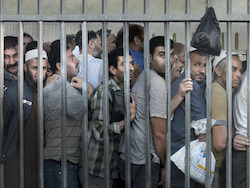
Check Point 300; (in)human borders
“I visited the Bethlehem checkpoint several times, where I took many photos. My street artwork is a collage of photos that I took at the time,” he tells us.
“That was a particularly harrowing experience,” Castaldo reflects:
“I was standing outside the checkpoint bars, taking pictures of Palestinian workers between ages 30 and 60, even 70, piled on top of one another for hours to cross the checkpoint and reach Jerusalem to work. These people repeated this same routine every day, from as early as 4 AM to 8 AM. And every day, they were forced by circumstances to suffer that same dehumanizing experience, simply to earn meager amounts of money (to feed their families).”
Castaldo felt “uncomfortable being a Western photojournalist, outside of the bars, taking pictures” of entrapped Palestinian workers. He explains the reasons behind his uneasiness:
“These people were already deprived of their dignity and I didn’t feel I had the right to take photos of them as if they were animals in a zoo. This feeling was so unpleasant that I decided not to show or sell those pictures to newspapers.”
But that feeling didn’t depart Castaldo’s conscience; in fact, it grew “stronger and stronger” to the point that Castaldo quit photojournalism altogether. Needless to say, those experiences in Palestine were imprinted in Castaldo’s mind until this day.
“After several years, around 2018, I decided to re-elaborate these photos and I turned them into something else entirely,” he says, explaining:
“I put together 40-50 images in one single image, which won several awards, including the Sony World Photography Awards in 2018. Feeling the need to convey Palestinians’ painful experiences to the world, I transformed that picture into a street artwork. As an artist, that was my way to narrate that experience: both my feeling of discomfort and the humiliation and abuse that Palestinians were forced to suffer.”
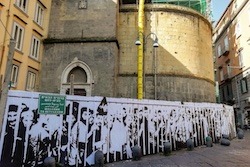
Welcome to Bethlehem
From Naples to Palestine
The Bethlehem mural is not the only street artwork that Castaldo dedicated to Palestine. In Via San Giovanni a Pignatelli, also in Naples, there is another breathtaking mural of a Neapolitan woman dumping a bucket of water at two Israeli soldiers who are trying to climb the wall.
Castaldo says that this work is, too, a “reconstruction of a photo taken during an Israeli military operation in Palestine”.
“The act of throwing water is quite common in Naples, especially by women who want to scare away kids when they are too loud in the street,” he says. “By associating this typical reaction with Israeli soldiers I tried to epitomize Naples’ solidarity with the Palestinian people. In my mind, that gesture became a symbol of anti-Zionist Naples.”
But Castaldo’s Palestinian inspiration exceeds that of the geographic boundaries of Palestine to Italy itself. “Subsequently, I decided to add an element to the Palestinian flag,” which is present in the mural, namely a portrait of Ali Oraney, a Palestinian-Italian activist who has been living in Naples since the early 1980s and died from Covid-19 some months ago.
“Ali played an important role in carrying out the struggle of the Palestinian people in Naples. He has been one of the key figures for the pro-Palestine activism in Naples and, more generally, in Italy and that is a tribute from my town to the Palestinian people and Ali.”
Human Connection
Like other artists, journalists and other visitors to Palestine, the human connection, for Castaldo, was far more powerful a rapport than books and news broadcasts. Spending time with Palestinians is usually the best answer to the dehumanization they suffer at the hand of mainstream media.
“Living in Palestine and the Arab world allowed me to create a strong bond with ordinary people living there, with their experiences, and with their daily struggles,” he says.
“I have made friends with many people there and I had the chance to experience some of these things firsthand, as a journalist and a human being. This is essentially what created my bond with the Palestinian people.”
Art and Change
We asked Castaldo whether he believes that art is capable of altering reality in any way.
As an artist “I have no illusion that my art can change things on the ground,” he says. “However, it is a way to offer my skills to what I perceive as important. It has undoubtedly a personal value to me. And I believe the political value of my artworks is intrinsically linked to the places in which they are set.” Castaldo’s “ultimate goal is to connect the city of Naples, where I live, to this cause.”
On art, politics, and freedom, the accomplished Italian artist says:
“I am perfectly aware that my art will not change such a dramatic political situation or have a key role, but I also think it can contribute because art is freedom. And, to me, it is important to point out that this freedom is not neutral, it has to stand on one side, on the right side.”
Beyond Palestine
Castaldo’s morally motivated and politically conscious artwork spans other areas and subjects beyond Palestine, although, at their core, all of these issues are connected.
Castaldo, who also worked as a photojournalist during the Egyptian revolution, dedicated another mural to Giulio Regeni, a young Italian scholar who was murdered in Egypt, presumably by Egyptian security forces.
“The mural was not only dedicated to Giulio Regeni, but to the Egyptian situation as a whole, because Regeni was part of it. Moreover, my ultimate goal was not only to denounce the single violation against Regeni but the repressive system in Egypt in its entirety.”
Castaldo is particularly happy that his artwork is very popular in the Middle East, where he continues to receive much support and accolades from the people and fellow artists in the region.
“Thanks to social media, my works are more popular in the Middle East than in Europe. And I have to say that their positive reactions, their support, and their solidarity make me proud,” he says.
Castaldo is not a typical artist. Ethics and morality play a crucial role in everything he does. He takes his inspiration from the people, and whenever possible, he exhibits his work also to the people. He feeds on the love and support he acquires from ordinary people, whether in Palestine or in Naples.
This artist of the people is on a mission to convey the kind of pain, suffering, and indignity that proud people often undergo in isolation. His art also tells the story of pride, beauty, and hope for a brighter future.
by Romana Rubeo and Ramzy Baroud

- Romana Rubeo is an Italian writer and the managing editor of The Palestine Chronicle. Her articles appeared in many online newspapers and academic journals. She holds a Master’s Degree in Foreign Languages and Literature and specializes in audio-visual and journalism translation.

- Ramzy Baroud is a journalist and the Editor of The Palestine Chronicle. He is the author of five books. His latest is “These Chains Will Be Broken: Palestinian Stories of Struggle and Defiance in Israeli Prisons” (Clarity Press). Dr. Baroud is a Non-resident Senior Research Fellow at the Center for Islam and Global Affairs (CIGA) and also at the Afro-Middle East Center (AMEC). His website is www.ramzybaroud.net
9 notes
·
View notes
Text
Silver linings and blessings in disguise
It's been a challenging time juggling Dad's recent health problems in the middle of a pandemic, as well as with a wedding planned around the corner.
Dad's stroke happened on a Thursday morning, 3 weeks ago.
I wasn't able to go into the ER with him, despite his memory loss and problems with speech, as there was a strict "no visitors allowed" rule due to Covid. I anxiously waited from home, for phone calls from his doctors to ask me questions about his history and condition, and to provide me updates.
At the same time, I had my phone blowing up that day (and for days afterwards) from phone calls from relatives. Word spread fast, they wanted to confirm what had happened and were there to try and give their support from afar.
After hours of waiting, I received a phone call to confirm the CT scan they did for him didn't show signs of a stroke; the doctors told us it might have been a "mini-stroke" ; not a full stroke, but an early warning sign one was on the way. But that didn't mean he hadn't had a stroke. Whilst a CT scan was a good indicator of whether or not a stroke had occurred, an MRI would create a clearer image of his brain to confirm this.
The hospital was so busy, he was discharged on the very same day. I was told to make a booking with his GP to receive a referral for an MRI with clearer imaging of his brain, so we could confirm it wasn't a stroke.
By the time he had been discharged, it was already past 5pm and he was tired, scared, and irritable, and just wanting rest at home. I called many GPs the first thing, the next morning, and a lot of them were booked out, not seeing new patients or told me, "why aren't you taking him to the hospital if you think he's had a stroke?!" 🙄🙄🙄...
Finally, when I got him an appointment, it was late in the afternoon (on a Friday), and I wasn't able to make an MRI appointment for him until Monday morning when they confirmed he had indeed had a stroke.
He's been recovering well since, and it's been taking a while for his neurologist, occupational therapist, speech therapist and physiotherapist to be available, but I understand everyone's doing what they can at this time. Things were a lot harder when Dad first had his stroke, especially because stress would trigger temporary memory loss and speech issues, but thankfully things are slowly getting better.
In some ways, this difficult time has brought many blessings in disguise.
Dad's stroke has also forced me to reprioritise some things in life, and reinforce existing ones.
Whilst any type of stroke is serious, we're thankful that the stroke Dad had was relatively small, and he'll be able to make a full recovery. We're taking it from the perspective that this was a warning to him, that he needs to take better care of his health, and a reminder to us to treasure life and our loved ones.
(Thankfully) all the phone calls have slowed down, but I'm still thankful for every single phone call and message I received reaching out to us.
We've been a lot healthier at home, and recently celebrated a special occasion with this melon "cake" that wasn't a cake at all 😂❤:

Whilst previously, I was more anxious about not wanting to upsetting people (even if I didn't particularly like them), taking care of myself (so I can also, in turn, take better care of my family) has been my main priority.
I blocked out a lot of the noise in my life which I realised was making me unhappy, and since then, I've learnt the benefits of not giving energy to people and things who drain my energy. I've gotten a lot better at saying "no", even if it's just to myself.
Whilst family time has always been important, we prioritise it even more now, to show each other throughout the day we care about each other.
Whilst obviously the pandemic and lockdowns are not a positive thing, the silver lining is how we get to spend even more family time together. We've been watching movies and Chinese dramas together and recently found two really good ones we enjoyed/are enjoying; "A Rational Life", and "A Thousand Goodnights".
Also, we still have a lot to look forward to, such as our wedding celebration with friends and family, and Tony and me moving into our new home. The planning has been stressful at times, but at the same time, I also feel warm and fuzzy knowing we'll have our very own family home together soon. I know Dad is also very proud of me for finding someone who will take care of me like Tony, and that we're finally getting married.
1 note
·
View note
Text
Why I consider Lipa as a best town?
Have you at any point caught wind of the little Rome of the Philippines? What about the strong flavored coffee with a fragrance reminiscent of aniseed? Or then again a foodie paradise town? Every one of them is only located in Lipa, one of the three cities in the province of Batangas.
I was born in Balete, Batangas but raised and live in Lipa City for almost twenty (20) years. Living in Lipa city, especially at this moment is like living on a highly urbanized city of Manila, because when you travel around the city, you will see different high end commercial buildings. Lipa is Batangas' most marketed region with the presence of prominent stores and eateries in the Philippines. Lipa City is well known as a “Little Rome of the Philippines” because of its multiple numbers of religious houses, convents, and churches. As of today, the traditional Visita Iglesia is almost near, where you go to different churches and prays. Perhaps Lipa City will be having a visitor from different places because of the churches; despite of Covid-19, churches will allow visitors, but still strictly implement the safety protocol. Lipeños are generally faithful to their religion and has solid family relationship which makes them worry free neighbors.
Kapeng Barako is one of the most popular drinks in Lipa. Most of the land area here is planting those coffee beans. It also has a celebration which called “Kapeng Barako Festival” and endeavors to have a Guinness Book World Record for the longest queue of individuals all the while drinking kapeng barako.
One reason why my mom decided to live here in Lipa is a result of the safetiness. Lipa is raised at around 1,025 feet above ocean level which is accepted to be the third most noteworthy among the urban communities in any event in Luzon. Less Risk to Flood - with its high height, Lipa stays to be a flood free territory as a rule yet with environmental change and heavy rains there's no more area anyplace that can be considered as 100% flood free. Concerning Lipa's case, there are consistently catchments territories everywhere on the city yet once the downpours halted the flood will die down very quickly. I have encountered different types of typhoon, but in our place did not experienced flood. When it comes to leadership, I can say that the leader is doing a great job. He is solving the problem in our city and make sure that no one is left behind. That is why Lipa City is receiving awards in different categories of improvement.
To sum it all up, since it is a small town community with an enthusiasm for all that is local, manageable and local area arranged. We are celebrated for development and business venture, our foodie culture, and our stunning craftsmanship. It has a rich history and valuable places that you can enjoy. I like my town because it is a safe place for me and it is my home sweet home.
2 notes
·
View notes
Text
Sunday, January 24, 2021
Biden Signs Orders to Expand Food Stamps and Raise Wages
(NYT) President Biden signed two executive orders on Friday to provide help to struggling families and raise wages for certain workers, turning once again to the power of the executive branch to advance his economic goals as the legislative chances for his broader stimulus package remain uncertain. “The crisis is only deepening,” Mr. Biden said during remarks at the White House, calling the need to help those out of work and unable to afford enough food “an economic imperative.” Mr. Biden’s executive orders are intended to increase the amount of money poor families get for food each month and provide additional meal money for needy students whose schools have been closed as a result of the coronavirus pandemic. A second executive order will lay the groundwork for the federal government to require a $15 an hour minimum wage for its employees and contract workers.
Biden is only the second Catholic president, but nearly all have been Christians
(Pew Research Center) The U.S. Constitution famously prohibits any religious test or requirement for public office. Still, almost all of the nation’s presidents have been Christians. That includes Joe Biden, a Catholic who often speaks of his religious convictions, quotes the Bible and attends Mass regularly. One-in-five U.S. adults say it is “very important” for the president to have strong religious beliefs, and 14% say it is very important to have a president who shares their own religious beliefs, according to a February 2020 Pew Research Center survey. A far higher share (63%) say it is very important to have a president who personally lives a moral and ethical life. Historically, about a quarter of presidents���including some of the nation’s most famous leaders, such as George Washington, James Madison and Franklin Roosevelt—were members of the Episcopal Church, the American successor to the Church of England. Presbyterians are the next largest group, with eight presidents, including Andrew Jackson and Ronald Reagan. Unitarians and Baptists (the latter including Bill Clinton and Harry Truman) are the groups with the third-largest share of presidents, each with four. There also have been four presidents who identify as Christian without a formal denomination, including Trump and his predecessor, Barack Obama.
Senate agrees to start Trump’s impeachment trial Feb. 9
(Washington Post) The impeachment trial of former president Donald Trump will begin Feb. 9 under a deal reached Friday by top Senate leaders—delaying by two weeks the high-stakes proceedings over whether Trump incited the violent Jan. 6 attack on the U.S. Capitol. The House on Jan. 13 passed a sole impeachment article, alleging “incitement of insurrection.” House leaders could have forced the Senate to begin the trial immediately by transmitting the papers across the Capitol. But a delay serves the former and current presidents: Trump has struggled to assemble a legal team and muster a defense, and President Biden needs the Senate to confirm most of his Cabinet appointees. Had no accord been reached, the trial would have started Tuesday and run uninterrupted by other Senate business until the Senate rendered its verdict.
Britain to discuss tighter travel restrictions
(Reuters) British ministers are to discuss on Monday further tightening travel restrictions, the BBC reported on Saturday, adding that people arriving in the country could be required to quarantine in hotels. Britain’s current restrictions ban most international travel while new rules introduced earlier in January require a negative coronavirus test before departure for most people arriving, as well as a period of quarantine. The government is considering making it mandatory for travellers to spend that 10-day quarantine period in a hotel for which they would have to pay, as a way to enforce the quarantine rules, the BBC said.
Belgium bans leisure travel for a month to combat pandemic
(AP) Belgium is banning all leisure travel abroad for its citizens as of next week and until March, in an effort to contain the spread of COVID-19 and its virulent variants. Prime Minister Alexander De Croo said Friday that visitors from Britain, South Africa and South America will have to quarantine for ten days to make sure they don’t bring dangerous variants into Belgium. In Belgium only essential business, family and humanitarian travel will still be allowed from next week until March. Over the past year, Belgium has seen a spike in cases after popular holidays because of returning travelers. February is the traditional month for Belgians to go skiing in the Alps or fly down south for warmth. The EU itself is also preparing measures that should make travel more difficult, including an introduction of new trans-border “dark red zones” where infections rates are particularly high and where all non-essential travel should be discouraged. Travelers from these areas could be required to undergo tests before their departure and be placed in isolation upon arrival in another location.
More than 2,300 arrested across Russia in protests for jailed opposition leader Navalny
(Washington Post) More than 2,300 people were arrested Saturday in protests spanning nearly 70 cities and towns across Russia calling for the release of jailed opposition leader Alexei Navalny — a massive show of defiance against President Vladimir Putin and his widening crackdowns against challenges to his power. Among the detained was Navalny's wife, Yulia, and many heads of Navalny's regional offices. It was the largest number of protesters taken into custody in a day since the Russian rights group OVD-Info began monitoring demonstrations in 2011. The rallies — from Russia’s Far East to central Moscow — came less than a week after Navalny returned from Germany, where he recovered from a nerve agent poisoning in August during a trip to Siberia. Navalny was arrested shortly after stepping off the plane. The wide turnout sent a powerful message to the Kremlin on the reach and resolve of Navalny’s network. The swift crackdowns by authorities underscored the pressure facing Russian authorities who must decide whether to keep Navalny behind bars.
Wuhan returns to normal as world still battling pandemic
(AP) A year ago, a notice sent to smartphones in Wuhan at 2 a.m. announced the world’s first coronavirus lockdown, bringing the bustling central Chinese industrial and transport center to a virtual standstill almost overnight. It would last 76 days. Early Saturday morning, however, residents of the city where the virus was first detected were jogging and practicing tai chi in a fog-shrouded park beside the mighty Yangtze River. Life has largely returned to normal in the city of 11 million, even as the rest of the world grapples with the spread of the virus’ more contagious variants. Traffic was light in Wuhan but there was no sign of the barriers that a year ago isolated neighborhoods, prevented movement around the city and confined people to their housing compounds and even apartments. Meanwhile, in Hong Kong, thousands of residents were locked down Saturday in an unprecedented move to contain a worsening outbreak in the city. Hong Kong has been grappling to contain a fresh wave of the coronavirus since November. More than 4,300 cases have been recorded in the last two months, making up nearly 40% of the city’s total.
Taiwan reports large incursion by Chinese air force
(Reuters) Eight Chinese bomber planes and four fighter jets entered the southwestern corner of Taiwan’s air defence identification zone on Saturday, and Taiwan’s air force deployed missiles to “monitor” the incursion, the island’s Defence Ministry said. China, which claims Taiwan as its own territory, has conducted almost daily flights over the waters between the southern part of Taiwan and the Taiwan-controlled Pratas Islands in the South China Sea in recent months. However they have generally consisted of just one or two reconnaissance aircraft. The presence of so many Chinese combat aircraft on this mission—Taiwan said it was made up of eight nuclear-capable H-6K bombers and four J-16 fighter jets—is unusual. Beijing has watched with growing concern increasing U.S. support for democratic Taiwan, especially during Donald Trump’s administration which left office on Wednesday.
On ‘Rooftop of Africa,’ Ethiopia’s Troops Hunt Fugitive Former Rulers
(NYT) The politicians and generals of Tigray, who ruled Africa’s second-most populous country for much of the past three decades through their political party, the Tigray People’s Liberation Front, or T.P.L.F., are now on the run. Since Jan. 7, Ethiopia’s military has killed or captured at least 47 people from a most-wanted list of 167 senior leaders of the T.P.L.F., including four of the party’s nine-member executive committee, according to Ethiopian state media reports. When Mr. Abiy came to power in 2018, his government quickly unseated many of these T.P.L.F. leaders, who over 27 years had overseen impressive economic growth, but ruled Ethiopia with an iron fist. Several were charged with corruption and human rights abuses, and some of them fled or retreated to their home base in Tigray. Fighting has raged across the region in recent weeks, according to U.N. security reports seen by The New York Times.
And now, a reading from an email according to St. Paul
(Reuters) If he were alive today, even St. Paul would be texting, Tweeting and firing off emails to get the news out, Pope Francis said on Saturday in his message for the Roman Catholic Church’s World Day of Social Communication. St. Paul, who lived in the first century of the Christian era, spread the new faith into Europe and Asia Minor and is believed to have written a great part of the New Testament. “Every tool has its value, and that great communicator who was Paul of Tarsus would certainly have made use of email and social messaging,” the pope said in the message, titled “Come and See”. Still, Francis said Paul was at his best while preaching in person, saying journalists and other communicators today should do more “hitting the streets ... meeting people face to face to research stories or to verify certain situations first-hand”. “In communications, nothing can ever completely replace seeing things in person,” he said.
2 notes
·
View notes
Text
[Lamia-Birdy-Bitty Daily life!14]
/Pro-Revenge/p3
Hello my Lamia lovers how are you all doing, good I hope...well everyone this is gonna be the finale you’ve all been waiting for. I forgot to mention in my last posts, yes I know Covid-19 is running like wildfire right now but the funeral just shy of the shutdown so no worries. Unfortunately this little update to the story happened after the outbreak, I warn you this is gonna be sad, it mentions death yet again so please those with sensitive bitties do not read it to them.
Without further a due, lets begin.
Leaving off with Rosie treating me and all my babies out to a nice dinner, it was at Ryo Coast. Got to see Juan again but sadly no Virgil, though he was excited to see my birdie boys. We had a wonderful time eating sushi, watching Juan do his spatula flipping tricks and simply enjoying each others company. Phthalo came with us too, I always love seeing him with Rosie, especially how he dotes on her.
I’m pretty sure she needed this more then me...
We got back later in the evening, I was about to turn to tell my boys to unbuckle from their seats [Rosie drove us] when Rosie took my arm and asked me to stay in the car with her. Needless to say I was confused but did as she asked, so we sat there for at least a few minutes before she started talking.
Rosie told me she wanted me to know the story between her and her sons, though she appreciated I didn’t pry into her business it was about time she told me the situation. Years ago, way before I was even a thought in the mind of my own parents Leo and Rosie started up a small grocery store for the people in their hometown. They weren’t rich, far from it in fact, they were somewhat struggling in the beginning. But Leo and Rosie were content with that, they were pretty simple people.
Their boys however were not, as years went by and they grew up the boys began resenting their parents for not giving them a better lifestyle. The two of them did their best in raising them but when those two turned 18 they just left for collage. Paid for by stealing the nest egg Rosie and Leo had used for the store, they didn’t realize it until a fire started in the store, sadly they also lived within the same building and they not only lost their business but their home as well.
The nest egg was for in case something like this happened but with it gone they had nothing to rebuild from; thank goodness for human compassion and kindness. Their community came together and helped them out, a friend of theirs bought up the property where their shop burnt down, turned it into a cafe and let them work there to earn money. After a while they saved up enough to rent a small apartment, this went on for a few years before something really changed their lives. She didn’t say what but I figured they were offered high paying jobs somewhere else and took them.
I mentioned that and she gave me a playful shrug, saying ‘you could say that’ and continued with the story. She went on about how she and Leo enjoyed their work, got plenty of money and saved it up. She then told me they bought the house near my apartment for the sake of retirement, she told me she found out where her sons had gone. They were working as executives of some random companies in California, they found out about this from some of their nieces and nephews. They married, each having two kids; all daughters and worst of all had never since told the grandkids of their existence.
At least not until recently.
None of them had any contact until recently, she told me that her son’s weren’t going to attended unless they were getting money out of it. What made her sad was they considered them to be burdens in their lives....she spared me any other details which I understood. Leo left them a little money but the rest of it went to the grand nieces and grand nephews as collage tuition for their own futures. As for the sons they just left when they got what they came for, I have to say I was pretty close to screaming in anger at that point but held it in check.
She started telling me about how a little after the fire is when she and Leo took in Phthalo and well the rest is history. I sat there in that warm car while our boys were asleep in the back, it took me a while to process this information but in the end....I took Rosie’s hand and thanked her for telling me everything.
So we sat there for a while, just...enjoying the company of one another. From time to time I’d look in the back seat at the sleeping serpents and fizzled out fouls hehe. At least I had these guys, after a little while I take my boys home.
Then the shutdown happened, everyone was stuck inside and not allowed to travel anywhere. Not a problem for me but for Rosie it was hard, she’s such a social butterfly. Thank goodness for Phthalo and my boys, they head over to hang out in her yard. Things were ok for a while but...when the shutdown ended something happened.
No Rosie didn’t contract Covid, she started getting visitors; why is it bad? These visitors were not the kind she wanted, they were her granddaughters from her two selfish sons. They showed up and started trying to shove her out of her own home, apparently the girls wanted a place of their own so they began badgering Rosie to go into a nursing home. Bless her for being strong willed, not to mention having someone to back her up secretly. I had gotten the numbers of some of her family in case something happened.
It was during one of these visits by the granddaughters that....Rosie had her accident. She fell down the stairs, instead of calling for help the girls just left her there. Phthalo came banging at my back door for my help, poor Rosie had a broken hip.
I...don’t wanna go into details but when Rosie was in the hospital for her hip she got very sick and was in critical condition. I worried not just for her but for Phthalo, I got to talk to her via FaceTime and told her if anything happened I’d take Phthalo in. [I already talked it over with my boys, they’d be ok with it if push came to shove] She told me not to worry cause she already planned to have Phthalo adopted by someone in the neighborhood, a friend of theirs whom Phthalo trusts. You have no idea what a relief that was to me.
While she was in the hospital I called Rodger and Betty, they’ve been watching the house for her. Though I was happy they were watching the house for Rosie I still was worried for her health, I called her a few times via FaceTime and so far things are going ok....
But then I got a call from Betty, Rosie had passed on during the night. I was a wreck for a good four hours, bless my boys for being there for me.
It was later...bout a month after her passing she had a funeral, overseen by Rodger and Jon. I couldn’t attend due to covid but Betty came and stayed at my apartment to mourn with me and my boys. We both needed consoling and its nice she was there for me.
It was later something happened....
After Betty and I made some lunch man in a sharp black suit came, I remembered him from Leo’s funeral. He was followed by Rodger and Jon. They all sat down in my living room, apparently this was the reading of Rosies will.
The Lawyer started with Phthalo being moved to his new home by Rodger; already done. Then the house was given to Jon who would over see its care and lastly was me, everyone was looking at me when the lawyer passed me a envelope. It was one of those lovely invitation envelopes. I opened it and pulled out a hand written letter...it read as follows. [S4 is not my name but i’m protecting my identity]
Dear, S4
I’m writing this to you because I feel this would help you understand my decision. You’ve been such a sweet neighbor to my husband and I, always bringing your sweeties to play or help us with little things. You never once asked for a reward or recognition, Leo had always saw you as a member of the family. I know you will not accept monetary gifts but I urge you to make this acceptation, a large bulk of my savings have been shared to family and donated to charity. The last bit is for you along with some other things, I want you to know my dear how happy you made me, Phthalo and my husband Leo, from the bottom of our hearts Thank you.
Sincerely
Rosie.
I look in the envelope to find a check....I won’t divulge the amount but it was more then I could have believed. I bursted into tears and nearly choked on my own sobs, I tried to make sense of it until Betty patted my back. Then told me something that threw me into a loop.
Betty: Rosie and Leo won the lottery back in the day, its what got them out of poverty. They pretended to have gotten better jobs and retired to keep the boys off their back.
Now...it made sense, everything made sense. Their house, their hobbies, an some other things. But now I was worried about the threat the boys had given me and I made that known, Rodger smiled and patted my hand. Everyone assured me that won’t happen, Rosie had disowned the boys and cut them from her will. If anything all they got left was a warehouse full of junk that Leo didn’t want.
So thats sorta the end, heh well I should mention the two sons were having financial trouble and were hoping on Rosie’s money to get them out. But since her money was gone they had gone bankrupt and lost every little dime, so if they did sue me they wouldn’t have money to pay for any lawyer. That and they had no idea their mother left me anything.
I used the money to pay for a year of rent and put the rest in savings. So everyone thats the story, revenge with a side of love.
[ For info on lamia bitties please visit @vex-bittys and for bird bitties please visit @coalition-aviary-bitty-adoption hope u enjoy]
1 note
·
View note
Link
Wanted in France: Thousands of Workers as Hotels and Restaurants Reopen PARIS — For six months, Christophe Thieret has been waiting for France’s grinding national lockdowns to be lifted so he can reopen his company’s restaurants and hotels in a picturesque corner of eastern France and recall the 150 employees who were furloughed months ago. But when he asked them to return for a reopening in mid-May, he faced an unexpected headache: At least 30 said they wouldn’t be coming back, leaving him scrambling to hire new workers just as he needed to swing into action. “When you close things for so long, people think twice about whether they want to stay,” said Mr. Thieret, a co-manager of the Heintz Group, which owns 11 hotels and three restaurants around the riverside city of Metz, near the border with Luxembourg. Restaurants and hotels across the country are facing the same problem. After months on furlough, workers in droves are deciding not to return to jobs in the hospitality industry. It’s a particular concern in France, which typically tops the list of the world’s most visited countries. A shortfall of perhaps as many as 100,000 restaurant and hotel workers, according to the industry’s biggest trade groups, is especially troubling because hundreds of thousands of people are looking for work after France’s worst recession in decades. Employers say it is becoming harder to lure job seekers to an industry whose future is more or less tethered to the vagaries of the coronavirus and the uncertainty of vaccine campaigns. Help-wanted signs hang in restaurant and hotel windows around the country. The missing manpower conundrum has emerged as thousands of hotels and restaurants that survived the crisis pivot toward trying to make up for an 80 percent plunge in business since last spring. The Covid-19 lockdowns have cost France’s tourism industry, a cornerstone of the economy, over 60 billion euros in lost revenue since last year. “We know we’re going to have customers again this summer — that’s not the problem,” said Yann France, the owner of La Flambée, a restaurant in the popular northern seaside city of Deauville. “The concern is that we won’t have an adequate work force at a time when we need to make up for a huge loss in sales.” Some say the problem may not be so stark, since international visitors aren’t yet flocking back to France, and job seekers, including students who need work to help make ends meet, could eventually fill any shortfall. But others say the precariousness of the businesses is the broader question. “The bigger issue is the uncertainty over the industry’s future,” said Thierry Gregoire, the owner of NT Hotel Gallery group, which owns five hotels and three restaurants around Toulouse. “Will things stay open, or could there be another shutdown because of a new virus?” For those already facing signs of a labor squeeze, it’s now clear that a generous state-subsidized furlough scheme intended to help French employers keep staff on standby has also created unexpected downsides. In the half year in which hospitality employees received 85 percent of their salaries to stay home, many have had ample time to re-evaluate their futures. “Many people are deciding they have other things to do than continue in a profession where nothing has been happening,” said Mr. Thieret, who is also a representative of France’s biggest hospitality trade organization, UMIH, the Union of Hospitality Trades and Industries. He added that thousands of other employers in the organization have reported the same recruiting difficulties. Catherine Praturlon is among those who decided to shift gears completely during the pandemic. A manager of a hotel in the Moselle region of eastern France for nearly 30 years, she had thought of doing something different but never made the leap. When the government shuttered hotels on and off for months, and travelers slowed to a trickle, the job became boring, she said. “You had no perspective on the future,” Mrs. Praturlon said. Updated May 2, 2021, 11:15 p.m. ET Instead of returning from furlough, she recently quit her job and took one in a different industry. (She said a confidentiality agreement prevented her from naming the field.) “The pandemic lit a fire under me to make that change,” she said. Restaurant and cafe owners are especially wary of losing skilled and seasonal staff as they gear up to handle an expected surge of patrons when those with open-air terraces are allowed to reopen on May 19, the first date in a graduated reopening announced this past week by President Emmanuel Macron. The government will evaluate every 15 days whether gradual reopenings in hospitality, culture, sports and related activities can continue or must be halted, depending on the trajectory of the virus. As in New York, London and other major cities where government restrictions were lifted, fed up consumers in France are ready to splurge pent-up savings on gastronomic delights and the joie de vivre denied to them for many months. France’s tourism professionals are also hoping that the imminent lifting of a yearlong ban on all but the most essential travel from the United States to the European Union, just in time for summer vacation, will draw back free-spending Americans after a long absence. The job fairs that employers typically use to fill vacancies have been put off because of a nationwide curfew and restrictions on large gatherings, making it harder to attract candidates in a sector that was already facing a labor squeeze before the pandemic. Mr. France, the owner of La Flambée, is trying to recruit a butler, a kitchen assistant and a chef de partie after some employees said they weren’t returning to work — so far to no avail. “The lack of manpower is stunning,” he said. Restaurants in the Calvados region, where La Flambée is, need to fill 3,000 to 4,000 full-time and seasonal jobs to be ready for an expected surge in customers, he added. Government subsidies have been vital to keeping businesses afloat. But they don’t necessarily guarantee that employers can protect the most skilled workers. Craig Carlson, the owner of Breakfast in America, a popular pancake restaurant in Paris, said the furlough schemes, while essential to the restaurant’s survival, had paradoxically put some of his higher-paid workers at a disadvantage. While waitstaff earning France’s monthly minimum wage of €1,539 get their full pretax salary under the furlough program, cooks and managers, who earn more, took about a 15 percent pay cut to stay home until the pancake house reopens. For one manager, a single father with two children, the reduced pay means “he’s really struggling,” Mr. Carlson said. At Mr. Thieret’s restaurants and hotels in Metz, the 30 unexpected job vacancies are not yet debilitating, since restaurant reopenings will come in stages and tourism and bookings at hotels are not likely to return to prepandemic levels quickly. Still, he said, it’s a challenge to replace employees with years and even decades of experience who decided during the pandemic that the work was no longer what they wanted. “At first people said this is nice, one or two months relaxing at home,” Mr. Thieret said. “Now, there’s a lack of long-term visibility about this industry, and some people are not so sure they want to be in it.” He is working with other hotel and restaurant owners in the area to create retraining programs, in hopes of luring new candidates. Mr. France said he and local restaurant and hotel owners were also working with unemployment offices in hopes of securing applicants in need of seasonal work to be ready for the anticipated crowds. “We’ll try to limit the damage that’s been done to our business,” Mr. France added. “But if we don’t have workers, it will be really hard.” Gaëlle Fournier contributed reporting. Source link Orbem News #France #hotels #REOPEN #Restaurants #thousands #wanted #Workers
0 notes
Text
Telemedicine Blog: How to Know If You Are Speaking to a Licensed Doctor
Telemedicine is the latest, greatest tool in healthcare. In this age of COVID, talking to your doctor via a phone, or an online video chat is more than just a convenience. The biggest plus? You don’t risk exposing yourself to COVID by going to a medical office. Telemedicine also saves time in travel and money on gasoline and parking.
But what if the call is not with your own primary care doctor? What if it’s a physician you have never met who is taking care of your loved one in a hospital? You can’t be there to see this doctor in person because of the visitor ban. Your only option is to talk to the voice on the other end of the line.
So, how do you know this voice is a real doctor? The answer is – you don’t. The person on the other end of the line may not even be licensed.
I discovered this issue first hand last September when my husband was in UC San Diego Health in La Jolla, California. It was torture to only get an update once every 24 hours from the hospitalist, whom I will call Dr. A. She was sensitive to my husband’s condition, and lobbied to get him moved to a floor where he would get more individualized care. I looked up Dr. A on the Medical Board’s website, and saw that it was clear, although that can be a false comfort; the Board only posts disciplines but not complaints. After a few days, Dr. A brought in another doctor to consult for possible radiation treatments. Dr. A introduced Dr. B as a “radiation doctor.” After discussing options and promising another update the next day, the doctors hung up.
I looked up Dr. B on the Medical Board website, and was alarmed to find she was not listed. I then called the Board’s consumer line and was told that Dr. B had no license of any kind in any state. That was disturbing. I did more research on this Dr. B and discovered that she was just a first year resident. In the state of California, medical residents are supposed to have a Post Graduate Training License, a PTL, within 180 days of enrollment in a three-year resident program. Dr. B. didn’t have a license yet. (She wouldn’t get her PTL until December, 2020.)
The next day when the doctors called with an update on my husband’s condition, I again asked what kind of practitioner Dr. B was, and for a second time was told she was a “radiation doctor.” Instead of questioning her, I asked who would be doing the radiation procedure since she was a resident, and heard a gasp on the other end of the line.
The thing is, I would have been fine if this resident had told me her status. My husband and I had consulted with other residents at UC San Diego Health before who had been up front with their status. Why did these medical professionals choose to lie to me? Because of this choice, I lost all confidence in both doctors because I no longer could believe anything they said to me. This added to the stress of not being able to be with my husband in the hospital at a time when his health was in a nosedive.
If I had been able to speak with these doctors in person, I could have seen their titles embroidered on their white coats, or on their ID badges. But because our conversations were only over the phone, via “telemedicine,” I was at a disadvantage. I could only rely on what they told me. .
A friend of mine also recently dealt with the issue of doctor identity at a Nevada hospital. The doctor who called her used the name “Shaw,” or at least that’s what she thought. As it turned out, the spelling of this doctor’s name was “Shah.” She had panicked when she could not find him listed with the Nevada Medical Board. My friend called me with her concerns, and I was able to track him down with the correct spelling and specialty for her. Had he fully identified himself when he first spoke to her, she wouldn’t have experienced this stress while her father was in the ICU.
The confusion in titles comes from the medical profession itself. People who have graduated from medical school are allowed to call themselves “doctors,” before they are actually licensed by state medical boards. Residents call themselves doctors, and even though most have that Post Graduate Training License, they are still not fully licensed physicians.
I checked with the Medical Board of California about whether doctors have to identify themselves, and was told they are required to do so in person in their offices or hospitals. However, there is currently no law requiring them to identify themselves on the phone or video chat via telemedicine.
Interestingly, the Washington Medical Commission is currently considering a bill to require doctors to identify themselves as part of the informed consent protocol for telemedicine.
Since telemedicine is now widely accepted, especially in this age of COVID, patients need to take the initiative when talking to anyone claiming to be a medical professional over a device. This includes doctors, physician’s assistants, nurse practitioners, nurses, and even administrators. First, ask the doctor to say and spell their name. Then have them state their medical specialty and their license number. Keep a notebook where you can write down who spoke to you, what was discussed, and the answers to any questions you had. This can be done pleasantly, and not in a confrontational manner.
Most people would be upset to know that their Uber or Lyft driver just had a learner’s permit, or that the guy flying their jetliner was a student pilot. However, when it comes to doctors, consumers usually assume that title means they are licensed -- when that is not the case.
Patients and their representatives have the right to know the identify of the person they are speaking to over telemedicine – and especially whether that person has a state license to practice medicine. It should be part of the informed consent process. Until doctors are required to identify themselves, it is up to consumers to take the initiative to ask -- and then to verify that so-called doctor with the state medical board.
0 notes
Text
Friday 1st January 2021
Review of the Year Q1 January, February, March 2020. Pre Pandemic Lockdown.

Hello, I’m wishing everyone a Happy, Healthy and Safe Year Ahead. We always say that don’t we, but boy does it have so much more meaning this time.
What can I say about the year just gone that hasn’t already been said? Well, they say a picture paints a thousand words so I’m going to choose some of my own photographs to illustrate the most positive things we experienced over the strangest year of our lives - the year of the Covid-19 coronavirus world pandemic, which is still raging today (and let’s hope I don’t get to say that again)
I’m cheating at the very beginning because I’m starting off by using a photo from Christmas 2019 when we had one of our usual type of trees in the Hall.

I’d usually decorate the Hall tree in the traditional red and gold
Below is the little tree that gained promotion this year, but in pink and white, silver and gold. That was a bit fancy for me, but the Owls liked it.

It put on some healthy growth throughout the year and played host to many perching little birds, mainly Blue, Great and Marsh Tits. I had to clear off all the cobwebs and take out all the bits of twig and leaf before it could come indoors.


And there it was, pressed into service. Every year in this house we’ve had at least two trees, a 7-8′ and a 5-6′ but this year, Little Tree was upgraded to the starring role. Hoorah Little Tree, you’ve done us proud. One of the best things to enjoy about the tree is all the memories that come with the decorations collected year after year from all around the world and some dating back to my Granny’s tree, although they’re looking rather delicate these days.
You can see our fairly recent tradition of perching ‘Travis’ the Christmas Pheasant in prime position just underneath the Angel. I think he looked fab this year, you can see him a bit more clearly than on a bigger tree.

January Garden Visitors: Sparrowhawk
As for January 2020, it brought some horrid bitterly cold, wet and windy weather. We were lucky on the 10th when we drove to Ms NW tE’s house and she put on a fantastic lunch that we both really enjoyed. That was the last time we sat down close at the table with anyone else outside of our own home and ate together* Last time we dined out-out was November 2018! Those were the days. 31st January 2020 was also the last time I had my hair cut - now it’s the longest it’s been since I was about half the age I am now and it might even be longer than then and still growing.
* Ms NW tY did pop around after work for supper in February and we meant to make that a fairly regular thing, but the only other time we got to eat together was when it was allowed outdoors in the Summer - sat at opposite ends of a very, very long table. That was weird.

January: sunset
The bad wet weather had started here in late October 2019 and we were caught in flooding in Cheshire. The Fire Brigade came to pump water off the road that we were sat on for a very long time. Much worse came with horrendous floods in Venice when some of the canals became unnavigable. World weather certainly made headlines in 2020 with flooding and raging fires devastating massive areas. The National Trust wildlife report I posted talks about the effects of the weather and climate change and what they’re trying to do to combat as much as they can.
I also see that in January we’d started to hear of Wuhan and to talk about hand washing. A friend’s sister is living in China and she’d got a flight booked to visit in April. Another friend said their lockdown and travel restrictions may be lifted by then. Little did we know.
Looking back at last year’s photos, pre blog, I was surprised I caught the Green Woodpecker in February, photo taken mid morning on the 16th.

This may be one of the last PP pictures I took (PP = Pre Pandemic) and it’s all the more remarkable because Storm Dennis had hit us.
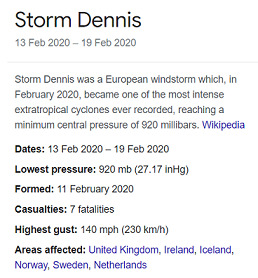
On the 17th we went shopping for a care package for Ms NW tY who was sick and home alone. Raging fever, cough, felt like she had a chest infection and limbs like lead. Similar to what I had back in November 2019. It took seven months for me to feel tip top again, so who knows what on earth we had - not Covid obviously because the medical experts say it wasn’t over here then. They also said no need to wear face masks and children were impervious...
I’ll just leave those thoughts there.

February Garden Visitors: lots of Pheasants
Meanwhile we were starting to talk about handwashing - a lot, 20 seconds minimum with soap and hot water. Sing Happy Birthday to You all the way through and keep on washing. Haven’t heard that so much in a while actually.

...and toilet rolls. Any mention of a forthcoming lockdown and panic buying prompts shortages immediately. It was toilet rolls, rice, pasta and flour. I’m sticking with my illustration of handwashing using one of my favourite soaps. Portuguese Soap, hard to beat but prohibitively expensive nowadays. We just looked at that link and whistled, drawing in our breath and sighing. I’m going to be refilling that bottle with something altogether more modest. Of course, so much more choice now for something a bit different, especially closer to home. Kent Soap. I’ve been glad this year that I ask for nice soap as a gift if anyone wants to know what I’d like and we got some for Christmas too, so that’ll keep us going.

White Hyacinths and Freesias for fragrance lifting the bleak days
The pandemic seemed to get worse and we were getting alarmed. I last went into a supermarket early mid March. Since then I’ve only been in National Trust shops, the petrol station and the pharmacy. I first wore a face mask when we took the car for its MOT, also mid March. Staff looked at me as though I was a bank robber. When we went to collect the car later the same day there was a notice on the door ‘Only two customers allowed inside at any one time’ and news was starting to spread...about health precautions, not about me.
Soon MOT tests were suspended and the country was facing a lockdown. Since then we had a time when both of our cars’ batteries died. We’ve SORN (officially declared off road) one - it’s taking us all our time to keep the other ticking over.

March Garden Visitors: hungry Rabbits at the seed trays
I started to write my Blog. At first I just used Google Sheets for seven daily scribblings and then I moved to this platform. Blog Number 1 here with the urls of the first few entries at the end. Little did I know at that stage that I’d be writing every day at least once a day and still going.
As National Lockdown got underway as well as writing we all started walking again and looking at nature and baking - boy did we all embrace baking last year. There must’ve been a country-weight of Sourdough and/or Banana Bread attempted with varying degree of success...lucky Joe Wicks came on board to get everyone up and doing a bit of keep fit, People started working from home, hosted social lives by internet, online quizzes and memes became a thing, a really big Thing. If we were lucky our food shopping was delivered straight to our door, TV cookery shows were full of advice on what you could use if you couldn’t source what you really wanted.
Just as my football team was on course for its first ever Premier League Championship win, the season had to be suspended (13th March) hoping to resume in April. It was a vain hope, but as our manager Jûrgen Klopp said, health and safety is far more important than anything else...we can wait 😉
Sport around the world, like everything else, had to be put on pause.
The situation got worse and every Thursday night at 8pm we went outdoors and clapped for our carers as they battled on trying to get to grips with this new virus and people falling sick in huge numbers. It was a whole new way of life.
To be Continued
--------------
WEATHER NEWS:
Forecasters are warning of possible further chaos, because the same conditions behind the 'Beast from the East' in 2018 - one of the worst storms to hit the UK in living memory - are forming again high up in the atmosphere.
The 'sudden stratospheric warming' (SSW) event happens when the temperature in the stratosphere soars by 50C (122F). This 'reverses' Britain's wind pattern, from the warmer west out in the Atlantic to the east – and Siberia.
It can take two weeks for the effects of a SSW to be felt. This was the case in February 2018 with the infamous Beast from the East, which saw much of the UK gripped by travel chaos and school closures amid heavy snow.
^ Not to mention Hospital closures too, which meant my operation was cancelled.
New Year’s Day Read:
The Wildlife Trust Marine Review of 2020
This report is also covered by the Daily Mail which also includes photos, video and information from other regional trusts around the country.
Decoration from the Standen Courtyard Christmas Tree
Once again some absolutely beautiful handiwork, The Tree of Life. What better message for a brand new year.
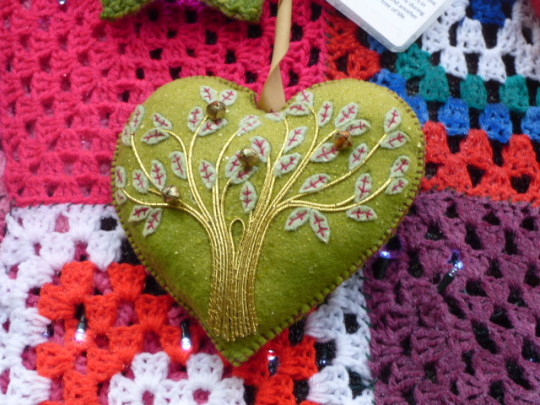
The Tree of Life symbol represents our personal development, uniqueness and individual beauty. Just as the branches of a tree strengthen and grow upwards to the sky, we too grow stronger, striving for greater knowledge, wisdom and new experiences as we move through life.
Music for New Year from the Rivertree Singers
a community choral ensemble in Greenville, SC. USA
‘Tomorrow Shall be my Dancing Day’ Let’s hope so.
youtube
0 notes
Text
[Lamia-Birdy-Bitty Daily life!14]
/Pro-Revenge/p3
Hello my Lamia lovers how are you all doing, good I hope...well everyone this is gonna be the finale you’ve all been waiting for. I forgot to mention in my last posts, yes I know Covid-19 is running like wildfire right now but the funeral just shy of the shutdown so no worries. Unfortunately this little update to the story happened after the outbreak, I warn you this is gonna be sad, it mentions death yet again so please those with sensitive bitties do not read it to them.
Without further a due, lets begin.
Leaving off with Rosie treating me and all my babies out to a nice dinner, it was at Ryo Coast. Got to see Juan again but sadly no Virgil, though he was excited to see my birdie boys. We had a wonderful time eating sushi, watching Juan do his spatula flipping tricks and simply enjoying each others company. Phthalo came with us too, I always love seeing him with Rosie, especially how he dotes on her.
I’m pretty sure she needed this more then me...
We got back later in the evening, I was about to turn to tell my boys to unbuckle from their seats [Rosie drove us] when Rosie took my arm and asked me to stay in the car with her. Needless to say I was confused but did as she asked, so we sat there for at least a few minutes before she started talking.
Rosie told me she wanted me to know the story between her and her sons, though she appreciated I didn’t pry into her business it was about time she told me the situation. Years ago, way before I was even a thought in the mind of my own parents Leo and Rosie started up a small grocery store for the people in their hometown. They weren’t rich, far from it in fact, they were somewhat struggling in the beginning. But Leo and Rosie were content with that, they were pretty simple people.
Their boys however were not, as years went by and they grew up the boys began resenting their parents for not giving them a better lifestyle. The two of them did their best in raising them but when those two turned 18 they just left for collage. Paid for by stealing the nest egg Rosie and Leo had used for the store, they didn’t realize it until a fire started in the store, sadly they also lived within the same building and they not only lost their business but their home as well.
The nest egg was for in case something like this happened but with it gone they had nothing to rebuild from; thank goodness for human compassion and kindness. Their community came together and helped them out, a friend of theirs bought up the property where their shop burnt down, turned it into a cafe and let them work there to earn money. After a while they saved up enough to rent a small apartment, this went on for a few years before something really changed their lives. She didn’t say what but I figured they were offered high paying jobs somewhere else and took them.
I mentioned that and she gave me a playful shrug, saying ‘you could say that’ and continued with the story. She went on about how she and Leo enjoyed their work, got plenty of money and saved it up. She then told me they bought the house near my apartment for the sake of retirement, she told me she found out where her sons had gone. They were working as executives of some random companies in California, they found out about this from some of their nieces and nephews. They married, each having two kids; all daughters and worst of all had never since told the grandkids of their existence.
At least not until recently.
None of them had any contact until recently, she told me that her son’s weren’t going to attended unless they were getting money out of it. What made her sad was they considered them to be burdens in their lives....she spared me any other details which I understood. Leo left them a little money but the rest of it went to the grand nieces and grand nephews as collage tuition for their own futures. As for the sons they just left when they got what they came for, I have to say I was pretty close to screaming in anger at that point but held it in check.
She started telling me about how a little after the fire is when she and Leo took in Phthalo and well the rest is history. I sat there in that warm car while our boys were asleep in the back, it took me a while to process this information but in the end....I took Rosie’s hand and thanked her for telling me everything.
So we sat there for a while, just...enjoying the company of one another. From time to time I’d look in the back seat at the sleeping serpents and fizzled out fouls hehe. At least I had these guys, after a little while I take my boys home.
Then the shutdown happened, everyone was stuck inside and not allowed to travel anywhere. Not a problem for me but for Rosie it was hard, she’s such a social butterfly. Thank goodness for Phthalo and my boys, they head over to hang out in her yard. Things were ok for a while but...when the shutdown ended something happened.
No Rosie didn’t contract Covid, she started getting visitors; why is it bad? These visitors were not the kind she wanted, they were her granddaughters from her two selfish sons. They showed up and started trying to shove her out of her own home, apparently the girls wanted a place of their own so they began badgering Rosie to go into a nursing home. Bless her for being strong willed, not to mention having someone to back her up secretly. I had gotten the numbers of some of her family in case something happened.
It was during one of these visits by the granddaughters that....Rosie had her accident. She fell down the stairs, instead of calling for help the girls just left her there. Phthalo came banging at my back door for my help, poor Rosie had a broken hip.
I...don’t wanna go into details but when Rosie was in the hospital for her hip she got very sick and was in critical condition. I worried not just for her but for Phthalo, I got to talk to her via FaceTime and told her if anything happened I’d take Phthalo in. [I already talked it over with my boys, they’d be ok with it if push came to shove] She told me not to worry cause she already planned to have Phthalo adopted by someone in the neighborhood, a friend of theirs whom Phthalo trusts. You have no idea what a relief that was to me.
While she was in the hospital I called Rodger and Betty, they’ve been watching the house for her. Though I was happy they were watching the house for Rosie I still was worried for her health, I called her a few times via FaceTime and so far things are going ok....
But then I got a call from Betty, Rosie had passed on during the night. I was a wreck for a good four hours, bless my boys for being there for me.
It was later...bout a month after her passing she had a funeral, overseen by Rodger and Jon. I couldn’t attend due to covid but Betty came and stayed at my apartment to mourn with me and my boys. We both needed consoling and its nice she was there for me.
It was later something happened....
After Betty and I made some lunch man in a sharp black suit came, I remembered him from Leo’s funeral. He was followed by Rodger and Jon. They all sat down in my living room, apparently this was the reading of Rosies will.
The Lawyer started with Phthalo being moved to his new home by Rodger; already done. Then the house was given to Jon who would over see its care and lastly was me, everyone was looking at me when the lawyer passed me a envelope. It was one of those lovely invitation envelopes. I opened it and pulled out a hand written letter...it read as follows. [S4 is not my name but i’m protecting my identity]
Dear, S4
I’m writing this to you because I feel this would help you understand my decision. You’ve been such a sweet neighbor to my husband and I, always bringing your sweeties to play or help us with little things. You never once asked for a reward or recognition, Leo had always saw you as a member of the family. I know you will not accept monetary gifts but I urge you to make this acceptation, a large bulk of my savings have been shared to family and donated to charity. The last bit is for you along with some other things, I want you to know my dear how happy you made me, Phthalo and my husband Leo, from the bottom of our hearts Thank you.
Sincerely
Rosie.
I look in the envelope to find a check....I won’t divulge the amount but it was more then I could have believed. I bursted into tears and nearly choked on my own sobs, I tried to make sense of it until Betty patted my back. Then told me something that threw me into a loop.
Betty: Rosie and Leo won the lottery back in the day, its what got them out of poverty. They pretended to have gotten better jobs and retired to keep the boys off their back.
Now...it made sense, everything made sense. Their house, their hobbies, an some other things. But now I was worried about the threat the boys had given me and I made that known, Rodger smiled and patted my hand. Everyone assured me that won’t happen, Rosie had disowned the boys and cut them from her will. If anything all they got left was a warehouse full of junk that Leo didn’t want.
So thats sorta the end, heh well I should mention the two sons were having financial trouble and were hoping on Rosie’s money to get them out. But since her money was gone they had gone bankrupt and lost every little dime, so if they did sue me they wouldn’t have money to pay for any lawyer. That and they had no idea their mother left me anything.
I used the money to pay for a year of rent and put the rest in savings. So everyone thats the story, revenge with a side of love.
[for information on Lamia’s please contact @vex-bittys and for bird bitties please contact @coalition-aviary-bitty-adoption , I’m gonna rest a little bit before posting another daily life]
1 note
·
View note